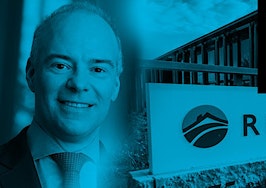Ron Peltier, the CEO of HomeServices of America is the most powerful and influential person in real estate according to sixth annual Swanepoel Power 200 (SP200), published by real estate management consulting and research firm T3 Sixty. Peltier beat out other top executives from Keller Williams, RE/MAX, Zillow, Realogy and others to take the top spot on the list of the 200 most powerful and influential figures in the industry.
“With the SP200, we aim to hold a mirror up to the industry, reflecting residential real estate back to itself by noting who wields the most power and influence (and in what order), whether by position, personal power, employee count, reputation and trajectory,” T3 Sixty chairman and CEO Stefan Swanepoel said.
In compiling the list, T3 Sixty considers eight different criteria: “the office leaders hold, their tenure, the size of the company they lead, its financial resources, their significance and impact on the industry, their company’s activities in the previous year, other activities outside their own company and their personal power and influence.”
Though the list includes some T3 Sixty paying clients, they make up a minority of the list, and Swanepoel told Inman that no special benefits are conferred by being a T3 Sixty client in terms of consideration for inclusion or placement.
The list is made up mostly white men — in an industry where the National Association of Realtors estimates 64 percent of Realtors are women — which highlights that the industry still struggles to appoint women to positions of power. In total, 81 percent of the list is male.
Dottie Herman, the CEO of Douglas Elliman, 19 on the list, is the first woman to appear by herself and not accompanied by a male partner. Helen Hanna Casey appears at number 10 on the list, alongside her brother and business partner Howard “Hoddy” Hanna. Sherry Chris, the CEO and president of Better Homes and Gardens Real Estate follows right behind Herman at 20.
The first ever SP200 was five years ago in 2014 and only six of the top 20 leaders from that time are still in leadership positions in the industry and included in the 2019 rankings.
Realogy is the most well-represented company, with 16 percent of the executives on the list working for Realogy Holdings Corp.
The top 10 most powerful and influential people in real estate, according to the list, are:
1. Ron Peltier, CEO, HomeServices of America

Ron Peltier. (Credit: HomeServices of America)
Peltier, the CEO of HomeServices of America since 1999, reached the top spot after finishing third and fourth respectively on the last two lists “based on his company’s tremendous, acquisition-fueled growth and its vast access to capital, the key driver in today’s rapidly changing residential real estate industry,” T3 Sixty said in a release.
HomeServices of America, like many of the other top brokerages, has made a number of big acquisitions in recent months. In late 2017, it acquired Long & Foster and in May 2018 it acquired Ebby Halliday. Just last week, HomeServices of America acquired Berkshire Hathaway HomeServices Florida Real Estate, a franchise that was also under the Berkshire Hathaway umbrella.
Through its acquisitions, HomeServices of America has grown to 900 offices with 42,000 agents.
HomeServices of America has also further closed the gap between itself and the no. 1 ranked brokerage in transaction sides. In 2017, HomeServices of America closed 328,355 transactions and NRT, the top-ranked brokerage, closed 346,941. For comparison, Howard Hanna Real Estate closed 90,468 and finished third on the Swanepoel 1000.
2. Gary Keller, CEO and chairman, Keller Williams Realty

Gary Keller. (Credit: Keller Williams)
Gary Keller made headlines last week when he announced he’s re-taking the role of CEO at the eponymously named Keller Williams, but it’s his iconic industry status that has kept him in the top five of the list every year since its inception in 2014 and as high as the top spot, last year.
As a leader, Keller has recently emphasized the need to place technology at the forefront and in the hands of agents to fend off a space crowded with growing competitors,
Keller Williams had supplanted RE/MAX as the nation’s top franchisor in sales by the end of 2017, although RE/MAX now appears to have re-claimed that mantle. And despite its U.S. growth rate slowing this year, the company still has 980 offices, 165,000 U.S. agents and over 190,000 affiliates across the world.
“Keller’s big technology bet exemplifies his style: strategic thinking, action based upon beliefs, and bold moves,” T3 Sixty said in a release. “2019 will be a pivotal year for Keller Williams as it may determine whether the company remains atop the leaderboard in real estate’s next era.”
3. Spencer Rascoff, CEO, Zillow

Spencer Rascoff. (Credit: Zillow Group)
It was a big year for Zillow under Rascoff, which launched its iBuyer initiative “Zillow Offers” and made major changes to its Premier Agent advertising and lead generation platform.
With the changes and still the industry-leading listing site – by a significant amount – revenue increased 21.9 percent in the first nine months over the same period in 2017 and T3 Sixty estimates the company will end 2018 with over $1.2 billion in revenue.
Zillow also showed it was willing to listen to its consumers, walking back some of those Premier Agent changes and making other adjustments to platforms based on consumer feedback.
Like many real estate companies, Zillow’s stock suffered towards the end of the year, but it has slowly been rebounding as 2019 progresses.
4. Ryan Schneider, CEO, Realogy

Ryan Schneider. (Credit: Realogy)
In Schneider’s first year as CEO of the largest real estate holding company in the country, Realogy announced an iBuyer program, rebranded Century 21 and started franchising both Corcoran and Climb Real Estate. He’s also tasked with ensuring the massive company can move swiftly in an era of real estate disruption, something he’s made a focal point of his first year.
5. Glenn Kelman, CEO, Redfin

Glenn Kelman. (Credit: Redfin)
In 2018, Redfin expanded its mortgage and concierge services to a multitude of new markets and increased the markets in which it operates its 1 percent listing fee. The company also further leaned into Redfin Now, its iBuyer program. But Kelman’s boldest move in 2018 may have come outside of the boardroom when he decided to use the power of the tech-focused, low-fee real estate brokerage he runs as a platform for social change to address racial housing inequality at Redfin headquarters and Inman Connect in San Francisco.
6. Robert Reffkin and Ori Allon, co-founders, Compass

Compass’ Robert Reffkin and Ori Allon. (Credit: Compass)
Compass’ explosive growth to more than 8,000 agents in 2018 was fueled by major acquisitions like Pacific Union International and Paragon Real Estate, as well as a fresh $400 million funding round. The company continues to bolster its tech team with the goal of building an end-to-end real estate platform.
7. Bob Goldberg, CEO, National Association of Realtors

Bob Goldberg. (Credit: NAR)
Under Goldberg’s leadership, the National Association of Realtors has been incredibly vocal in its advocacy for tax reform and other legislative policies. Goldberg has aggressively restructured the 110-year old trade organization and ended its partnership with Upstream. But the year was not without its controversies, including the new logo unveiling and subsequent rollback and the fight over increased dues.
8. Adam Contos, CEO, RE/MAX

Adam Contos. (Credit: RE/MAX)
Since taking over as sole CEO of RE/MAX, Contos has aggressively leaned into technology and is building a real estate platform, headlined by the acquisition of real estate startup booj. The brand’s Motto Mortgage franchises have also begun to populate the country and growth remains consistent.
9. John Peyton, CEO, Realogy Franchise Group

John Peyton. (Credit: Realogy)
Peyton has lead Realogy’s portfolio of brands since early 2017. He oversaw the expansion of that group in 2018 to include Corcoran and Climb Real Estate alongside Better Homes and Gardens Real Estate, Century 21, Coldwell Banker, ERA Real Estate and Sotheby’s International Realty. He’s tasked with leading and supporting nearly 300,000 agents in 15,000 offices that cover 115 countries and territories.
10. Howard ‘Hoddy’ Hanna, chairman, and Helen Hanna Casey, CEO, Howard Hanna Real Estate

Howard “Hoddy” Hanna and Helen Hanna Casey. (Credit: T3 Sixty)
Under the leadership of this second-generation duo of siblings, Howard Hanna acquired Allen Tate Compass to create a massive footprint across the Mid-West, Mid-Atlantic and Northeast. The company now has more than 11,000 agents and employees in 326 offices that generate more than $23 billion in sales.
To see the full list, visit https://www.t360.com/power200/









